Neutrality has become an issue of war or peace.
Neutrality has become an issue of war or peace.
The commission created by the Federal Department of Defense, Civil Protection and Sport (DDPS) has presented its report with more than 100 recommendations in 7 areas on how Switzerland should orient its security policy for the future. The report stated: “Cooperation with NATO and the EU should continue to deepen in order to achieve a common defense capability and develop into real defense cooperation”.
We asked Massimiliano Arif Ay, the chairman of the Communist Party of Switzerland, on the historical neutrality of the country, the recent steps candidate to remove the country’s neutral status and strengthening ties with NATO.
What has led the Swiss government to seek closer ties with NATO and greater defense cooperation with the EU (which is not really a military organization)?
This report, the conclusions of which if approved even minimally would mark a total break in Swiss foreign policy, did not come out of nowhere.
NATO’s discomfort with Switzerland’s neutrality
I believe that Switzerland’s foreign policy of neutrality and independence began to be uncomfortable for NATO (i.e., the U.S.) and the European Union as early as the ‘90s. In those years some voices are raised in our country that begin to think about the need to change the concept of neutrality that was in place during the Cold War, to bring it up to date with the new world context. Let us not forget that in 1996 Switzerland joined NATO’s Partnership for Peace and a few years later our country participated in NATO “peacekeeping” mission in Kosovo. At the same time, the European Union also starts lobbying for us to become a member, complaining that Switzerland is taking advantage of the benefits of the EU market without having to fulfill its duties. At that time, however, the process evolved very slowly, without ruptures or breakthroughs, probably also because internal resistance in Switzerland was still very substantial and pressure from abroad not yet so strong. The most profound and serious turning point occurs following the Russian army’s intervention in Ukraine in February 2022.
After Russia’s intervention in Ukraine
After asserting with conviction in the early days that Switzerland would not impose sanctions on Russia, the federal government, – after a coincidental visit and meeting with the U.S. ambassador to Switzerland – twists its statements and adheres to all EU sanctions (which are a very different thing from UN sanctions). From that moment on, the situation begins to evolve very quickly. The government says that Swiss neutrality as it exists today no longer makes sense and that we need to think about a profound transformation. All of the EU sanctions packages have been punctually adopted, the ban on arms exports has been questioned on several occasions, and the federal government begins to publish at an alarming pace various documents and reports stating the need to integrate Switzerland more and more into the European Union and NATO, deepening the interoperability of the respective armed forces and joining military projects such as the European “Sky Shield Initiative” or the more recent decision to participate in the “PESCO” project for the military mobility.
Internal factors for desire to abandon neutrality
I think that the causes for this strengthening of ties are therefore complex, but essentially two: on the one hand, NATO and the European Union could no longer stand our neutral foreign policy and took advantage of the war in Ukraine to accelerate the process, starting lobbying politically, economically and exploiting not least the firepower of the media and all those circles of “think tanks” and intellectuals who obey Washington and Brussels. The second reason is that internal resistance to this process is getting weaker and weaker because our own political class is getting weaker and less capable of pursuing our country’s national interests, and because there is a segment of the ruling group that actually has economic and political interests in getting Switzerland to join these two organizations, and as mentioned, now has the opportunity to use this historic moment to give it a new push. Not least of all, except for our Party, the rest of the left in our country has been the most vocal faction in calling for sanctions on Russia and considering exporting arms to Ukraine, and I would not be surprised if they will also call for explicit NATO membership one day.
“The military needs to focus on its defense capacity. We recommend increasing the defense budget to 1 percent of gross domestic product by 2030.” I wonder if this has anything to do with preparing for the US (especially a possible Trump administration) pressure on NATO members to increase the share of their military spending? If not, what kind of military threat does the Swiss government see and why does it want to increase spending?
No military threats to worry
Switzerland today does not actually have military threats to worry about. We are in the center of Europe surrounded by NATO countries, so to imagine a “classic” invasion is absurd, except by NATO itself (but then why do we repeat that they are our friends and allies?), but one does not see the point or usefulness of it. Nor do I see any serious and concrete risks of a missile attack on Switzerland, which poses no security risk to anyone. Paradoxically, on the other hand, it is precisely by strengthening military cooperation with NATO, considering exporting war material to countries at war, or considering sending our soldiers abroad, in short, abandoning our historical neutrality that this risk is realized. In fact, by doing so, we are taking sides and becoming part of a military bloc, over which we do not even have any decision-making power. This means, in the event of a larger-scale conflict, becoming legitimate military targets for the other side.
I don’t think the calls for increased military spending are exclusively about this specific statement by Trump to push NATO countries to increase contributions, not least because the calls for increased Swiss defense budgets have been coming from the military sectors regularly and long before there were these statements, but they certainly still have to be placed in the context of the ongoing arms race across the West to prepare for war with Russia and China, and a Swiss entry into NATO would also require an increase in its military spending to meet its obligations and show “credibility with our partners” as our government often repeats.
Could the declining revenues of Swiss arms dealers play a role in this decision? Do you think the US has a role in these discussions?
Here again I think it is possible to speak of an intertwining of domestic and international political motivations.
The arms industry
If you look at the data in perspective, although very irregularly, Swiss arms exports since the late 1990s have grown. In the last 2-3 years, some EU countries have complained about Switzerland’s ban on arms exports to send them to Ukraine and have said, as a way of pressure, that they will no longer rely on our supplies in the future because this ban makes it an unreliable partner. Since there was actually a 27 percent drop in arms exports in 2023, the arms industry and the part of the bourgeoisie that supports them has made this narrative its own and is exploiting it to gain an easing of arms export constraints and thus pursue its own interests and profits. In fact, if you look at the data, the decline that there was in 2023 is very similar to that seen between 2020 and 2021, or 2011 and 2012, when the war in Ukraine still existed only in NATO drawers.
Regarding the army’s budget, while it is true that in 1990 1.4 percent of GDP was invested in national defense compared to today’s share of 0.7 percent, it is also true that for the past 10 years or so there has been a reversal of the trend: the budget has risen from 3.95 billion in 2010 to about 5 billion in 2021. An interesting fact also happened recently: the Swiss Armed Force suddenly “discovered” that it had CHF 1 billion less than it needed to pay for defense purchases it had already made. In recent years, coincidentally, agreements have been signed to purchase new fighter jets (the U.S.-made F-35) and to strengthen air defense systems (the U.S.-made Patriot systems).
To prepare for the “new Cold War”
Military planners have known full well for years that these purchases would make it impossible to comply with existing budget constraints, but they proceeded anyway, and what is more, the government continued to approve new weapons orders, living beyond its means. One wonders if there was pressure to proceed with the purchase of these U.S. weapon systems anyway despite the state of the military’s finances (these systems among other things create dangerous technological constraints of our country vis-à-vis the U.S., and thus also political constraints, but this is a topic that would merit ad hoc conversation). However, the war in Ukraine turned out to be a stroke of luck and was the occasion to start discussing, under the pretext of the threat posed by Russia to global security, an increase in the army budget that is intended to be raised to 1 percent of GDP, going to partially solve the holes caused by financial planning errors. To these domestic policy reasons must of course also be added the fact that if Switzerland wants to intensify its cooperation with NATO, increase its participation in the programs of the Alliance and the European Union, prepare for the “new Cold War,” and show itself to be a “reliable partner,” these expenditures will have to increase.
What, in brief, led Switzerland to pursue a “neutral” foreign policy? Do you advocate the continuation of this policy of neutrality today? How do you think Switzerland should pursue its foreign policy?
The history of Swiss neutrality is long and complex and is still debated, and given today’s context, attempts are now being made to exploit it from all sides.
A history of Switzerland’s neutrality
What is certain is that on November 20, 1815, in application of the decisions of the Congress of Vienna, Switzerland obtained international recognition of its neutrality, which was also in the interest of the rest of Europe as it promoted peace and stability on the Continent. It must be said that in truth the concept of neutrality has never really been codified among the purposes of the Confederation and appears clearly only in an article of the Constitution on the powers of the federal parliament and government, to which must be added the signing of the 1907 Hague Convention on the Right of Neutrality, which is, however, now very old and covers only a few areas of this issue. However, this international recognition of neutrality will be sufficient for Switzerland to position itself over time as a mediating figure, increasing its diplomatic prestige and its international venues, building a role as a credible and reliable actor in this area.
I don’t want to sound naïve: we know that Swiss neutrality was also exploited on several occasions by the ruling class for its own affairs, just think of the apartheid period and Switzerland’s ties with the government of South Africa at that time. We also know that Switzerland during the Cold War, although not officially aligned, was certainly much closer to NATO and the Western bloc and that there were several contacts between Switzerland, NATO and other structures of this bloc. However, what really matters is that Switzerland was politically recognized as a neutral state in the world. This allowed it, for example, to serve as a platform for dialogue between the West and the Soviet bloc, and again a few years ago between the Russian Federation and the US. After what was decided in connection with the war in Ukraine, this is in danger of no longer being able to happen. Russia has made it clear that we have become a hostile and untrustworthy country, and it cannot be ruled out that, given our behavior and our insistence on strengthening ties with the EU and NATO, other countries will begin to think the same and become suspicious of our trustworthiness.
“Neutral Switzerland” in a multipolar world
As the Communist Party, we cannot accept this. We have always been in favor of Swiss neutrality, and today this applies even more so. With the emergence of a multipolar world, this tradition must be vindicated and strengthened, both because it is a better guarantee for our country’s national security, but above all because it is only by maintaining a policy of permanent neutrality, rejecting military blocs, and serving as a platform for dialogue and acting as a bridge between the West and the rest of the world that Switzerland will be able to contribute to the construction of a new international order, based on cooperation, mutual respect and non-interference in the affairs of others.
That is why it is urgent for our country to reverse course while there is still time, but it needs to be done quickly, and we need someone with the courage and political independence to do this. Unfortunately, as already mentioned, on the left we have remained the only Party to say this. Fortunately, however, a part of the Swiss nationalist bourgeoisie still carries this discourse forward and has recently launched an initiative, which is also supported by our Party, for the inclusion of permanent neutrality in the Federal Constitution and a ban on membership in military alliances. This initiative, which will be submitted to a popular vote, is for us Swiss communists, the absolute priority battle in the coming years. Without neutrality, Switzerland is destined to join NATO and the European Union, losing its national sovereignty, which also means the inability to proceed with social and economic reforms in favor of workers and the country, but it also means posing risks to national security and potentially having to prepare our people for war.







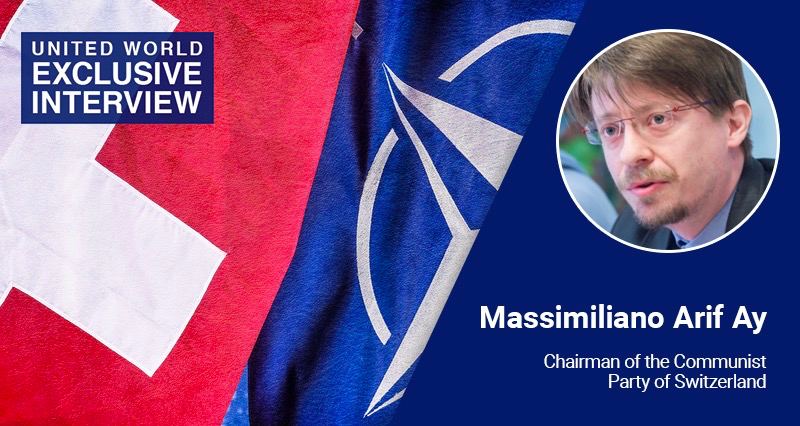
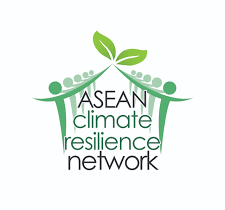
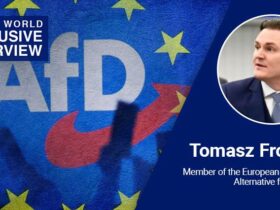

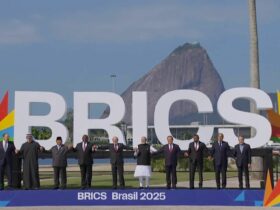


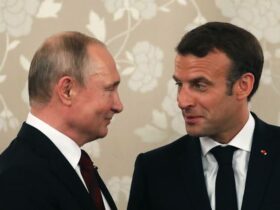


Leave a Reply